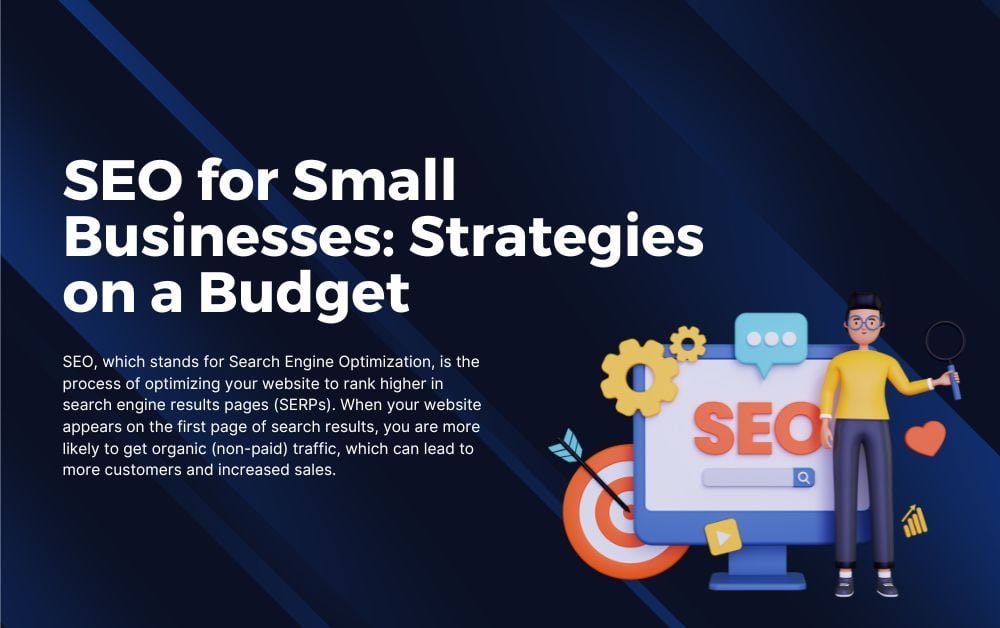In today’s digital age, online presence is crucial for small businesses. However, many small business owners face budget constraints that make investing heavily in search engine optimization (SEO) challenging. The good news is that there are cost-effective SEO strategies that can help small businesses improve their online visibility and attract more customers. These strategies may include optimizing your website’s content with relevant keywords, creating high-quality and shareable content, and utilizing local SEO techniques to target a specific geographic area. By implementing these tactics, small businesses can gradually enhance their online presence and compete more effectively in the digital marketplace.
One particularly effective way to boost your online visibility is by partnering with a reputable SEO company in Dubai. Such experts can provide tailored SEO solutions that align with your budget and business goals. Whether you’re looking to rank higher in search engine results, drive organic traffic, or improve your website’s user experience, a dedicated SEO company in Dubai can leverage their expertise and industry insights to help your small business thrive in the competitive online landscape. With their assistance, you can navigate the complexities of SEO without breaking the bank, ultimately achieving sustainable growth and success in the digital realm.
Understanding the Basics of SEO
Before diving into specific strategies, let’s start by understanding SEO basics. SEO, which stands for Search Engine Optimization, is optimizing your website to rank higher in search engine results pages (SERPs). When your website appears on the first page of search results, you are more likely to get organic (non-paid) traffic, which can lead to more customers and increased sales.
The Importance of Keyword Research
One of the fundamental aspects of SEO is keyword research. Keywords are the words and phrases that people type into search engines when looking for products or services. By identifying the right keywords for your business, you can tailor your website content to match what your target audience is searching for.
How to Do Keyword Research on a Budget
- Use Free Tools: Several free keyword research tools are available, such as Google’s Keyword Planner and Ubersuggest. These tools can help you identify relevant keywords for your business.
- Analyze Competitor Keywords: Check out your competitors’ websites to see which keywords they target. This can give you valuable insights into which keywords are relevant to your industry.
- Long-Tail Keywords: Focus on long-tail keywords, which are longer and more specific phrases. These keywords often have less competition and can be easier to rank for.
On-Page SEO
On-page SEO refers to optimising individual web pages to improve search engine rankings. It involves optimizing various elements on your website, including content, meta tags, and images.
Budget-Friendly On-Page SEO Tips
- Optimize Title Tags: Ensure each page on your website has a unique and descriptive title tag that includes relevant keywords.
- Create High-Quality Content: Producing valuable and informative content that addresses your audience’s needs can boost your website’s SEO. You don’t need a big budget for this—just a commitment to creating valuable content consistently.
- Optimize Images: Compress images to reduce their file size and use descriptive file names and alt text. This helps improve page load times and makes your website more accessible.
Off-Page SEO
Off-page SEO involves activities that take place outside of your website but have an impact on your search engine rankings. One of the most important off-page SEO factors is building high-quality backlinks to your website.
Building Backlinks on a Budget
- Guest Posting: Write guest posts for other websites in your industry. In exchange for your valuable content, you can often include a backlink to your own website. Be sure to choose reputable websites for guest posting.
- Social Media: Share your content on social media platforms to increase its visibility. When others share or link to your content, it can lead to natural backlinks.
- Online Directories: List your business on online directories and review sites like Google My Business, Yelp, and TripAdvisor. These listings often include backlinks to your website.
Note:
Unlock your website’s potential with prontosys Off-Page Optimization Services in Dubai. Elevate your online presence, boost rankings, and attract more customers. Join us to dominate the digital landscape and drive business growth.
Local SEO
If your small business serves a local area, local SEO is essential. Local SEO focuses on optimizing your online presence for local search queries.
Cost-Effective Local SEO Strategies
- Claim Your Google My Business Listing. This free and powerful tool helps your business appear in local search results. Ensure that your listing is complete and accurate.
- Encourage Customer Reviews: Positive reviews can boost your local SEO. Encourage satisfied customers to leave reviews on platforms like Google and Yelp.
- Local Keywords: Use location-based keywords in your website content. For example, include phrases like “Denver bakery” in your content if you’re a bakery in Denver.
Monitoring and Measuring Your SEO Efforts
Once you’ve implemented these budget-friendly SEO strategies, monitoring and measuring your efforts to see what’s working and what needs improvement is essential.
Google Analytics
Google Analytics is a free tool that provides valuable insights into your website’s performance. You can track metrics like website traffic, user behavior, and conversion rates.
Key Metrics to Monitor
- Organic Traffic: Keep an eye on the traffic coming from organic search. An increase in organic traffic indicates that your SEO efforts are paying off.
- Bounce Rate: A high bounce rate suggests visitors leave your website quickly. Analyze pages with a high bounce rate and make improvements to keep visitors engaged.
- Conversion Rate: Measure how many website visitors take the desired actions, such as purchasing or filling out a contact form. Improving your conversion rate can lead to increased sales.
SEO Tools
There are several free and paid SEO tools available that can help you track your rankings, analyze your competitors, and identify areas for improvement. Some popular options include Moz, SEMrush, and Ahrefs.
Staying Up-to-Date with SEO Trends
The field of SEO is constantly evolving, with search engines like Google frequently updating their algorithms. To maintain your website’s visibility and rankings, it’s essential to stay informed about the latest SEO trends and best practices.
Online Resources
- Blogs: Follow reputable SEO blogs like Moz, Search Engine Journal, and Neil Patel’s blog to stay up-to-date with industry news and tips.
- YouTube: Many SEO experts share valuable insights and tutorials on YouTube. Consider subscribing to channels like “Ahrefs” and “Backlinko.”
- SEO Communities: Join online forums and communities where SEO professionals discuss trends and share advice. Reddit has several SEO-related subreddits where you can participate in discussions.
Conclusion
SEO doesn’t have to break the bank for small businesses. By focusing on cost-effective strategies like keyword research, on-page and off-page optimization, local SEO, and monitoring your efforts, you can improve your online visibility and attract more customers without a hefty budget. Keep learning and adapting to the ever-changing SEO landscape, and your small business will continue to thrive in the digital age.
Read the next blog – The Importance of Video in Social Media Marketing










